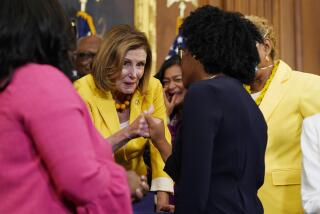Panel OKs Key Piece of Clinton Health Proposal
- Share via
WASHINGTON — The first congressional subcommittee to consider sweeping health legislation handed President Clinton a victory Tuesday as it endorsed by the narrowest of margins the most controversial piece of the Administration plan--the proposal that employers be required to pay 80% of health insurance costs for their workers.
With the first vote by the Ways and Means Committee’s subcommittee on health, the battle over health care reform finally moved from rhetoric to action. The significance of Tuesday’s session was underscored by the presence of about two dozen Administration officials in the first two rows of seats in the hearing room and the crowd of lobbyists standing in the rear and lining the hallway outside.
The subcommittee’s early votes are important primarily as tests of sentiment. The overall shape of the legislation that finally emerges from its work will not become apparent until later this week, when individual members begin offering alternatives to the draft put together by Rep. Pete Stark (D-Oakland), who chairs the panel.
Furthermore, the subcommittee’s efforts represent only a single, early step in the long road to health reform. Other committees and subcommittees also will have their say, as will the full House and Senate.
Nonetheless, the White House was jubilant after the panel voted, 6 to 5, to defeat an amendment proposed by Rep. Fred Grandy (R-Iowa) that would have stripped Stark’s bill of its requirement that employers pay 80% of their workers’ health care premiums--one of the elements that the Stark plan shares with Clinton’s.
In other votes, the subcommittee also brushed aside efforts to restrict the unlimited tax deductions that businesses now enjoy in exchange for their expenditures on employee health benefits. Some critics of the Clinton plan have contended that putting such limits on deductions would be a more efficient way of bringing health care costs under control than the government-imposed caps on premiums proposed by the President.
Although business interests strenuously oppose the employer mandate, saying that it would destroy hundreds of thousands of jobs, Clinton’s allies in Congress say that they see no other way to achieve the President’s goal of providing health coverage for every American.
Only one Democrat, Rep. Michael A. Andrews of Texas, defected from party ranks to side with Republicans, who were united in their effort to delete the employer mandate from the bill.
White House officials said that they considered the vote a major victory, significant both because the mandate is the single most important element of their plan and because the House committees have proved more hostile territory to the Clinton plan than had been expected.
The Administration also dodged a bullet with the vote. A defeat likely would have been portrayed as proof that Clinton’s bill was moribund.
While the White House still expects some bruising votes on its plan--probably including some in Stark’s subcommittee later this week--officials have taken encouragement from signs that key Senate committees may be moving toward some kind of compromise.
“There will still be tons of votes along the way, and health reform will be declared dead a dozen times,” said one Administration official. In the end, however, “common sense will win out.”
Meanwhile, an analysis by the influential health care consulting firm Lewin-VHI for the conservative Heritage Foundation found that the employer mandate proposed by the Clinton Administration’s health reform package would reduce employees’ wages in those firms that do not now provide insurance, and eliminate between 155,000 and 349,000 jobs.
The report, released during a Senate Finance Committee hearing by Stuart M. Butler, vice president of the foundation, showed that an estimated 88% of the cost of the employer mandate would be passed on to workers through wage cuts, resulting in total earnings losses of an estimated $20.6 billion during the first year alone.
In 1998, average yearly wages would be about $189 less per employee than they otherwise would be, among all full- and part-time workers, the report said. Wages of employees in firms that now offer coverage would be about $400 more on average annually than they otherwise would be, while those of workers in firms that do not now offer coverage would be about $1,243 less, the report said.
“For some firms who already provide health insurance coverage to their employees, health care costs may remain unchanged, or decline,” the report said. “For other firms, particularly those who currently do not offer health insurance to their employees, costs will rise, substantially in some cases.”
Nevertheless, the report said that the Clinton health proposal would result in a decrease in household expenditures for health care, compared to no health reform at all--although the amounts would vary greatly when wage reductions were taken into account.
Lorrie McHugh, a White House health care spokeswoman, said that several analyses by independent health care consulting firms have shown that the Clinton plan would result in job creation and that a study conducted by the Congressional Budget Office showed that the Clinton proposal would have a “negligible” impact on employment.
In St. Louis, First Lady Hillary Rodham Clinton continued her campaign for health reform, speaking to about 2,000 members of the Washington University community. As she did in Colorado on Monday, Mrs. Clinton described the Administration’s plan only in broad outlines.
Times staff writers Paul Richter in Washington and Edwin Chen in St. Louis contributed to this story.
More to Read
Get the L.A. Times Politics newsletter
Deeply reported insights into legislation, politics and policy from Sacramento, Washington and beyond. In your inbox twice per week.
You may occasionally receive promotional content from the Los Angeles Times.










